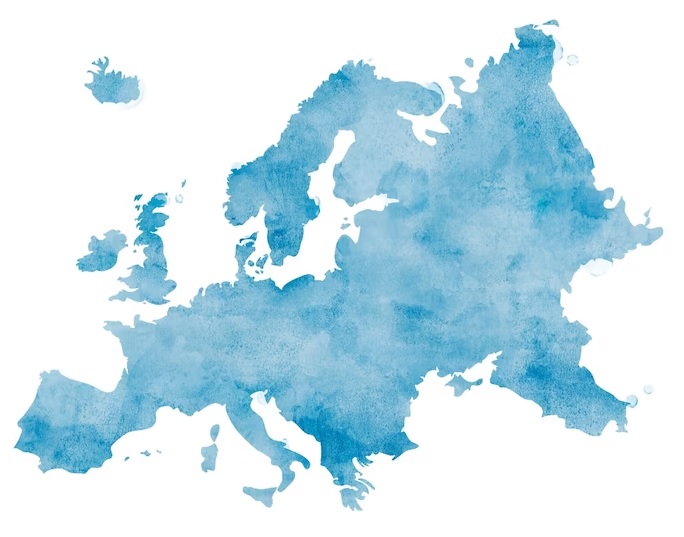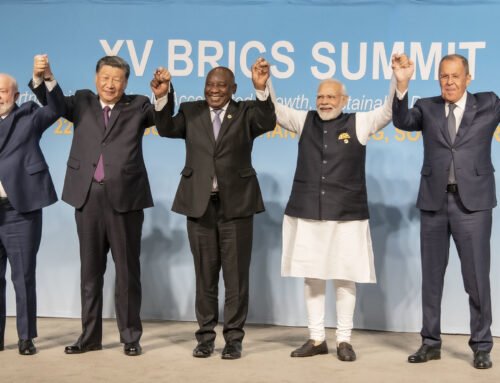(PULASKI POLICY PAPER) The 2022 U.S. Midterms Implications for the Security of Central and Eastern Europe (Katarzyna Pisarska)
Autor foto: Domena publiczna

The 2022 U.S. Midterms: Implications for the Security of Central and Eastern Europe
November 17, 2022
Author: Katarzyna Pisarska




(PULASKI POLICY PAPER) The 2022 U.S. Midterms Implications for the Security of Central and Eastern Europe (Katarzyna Pisarska)
Autor foto: Domena publiczna
The 2022 U.S. Midterms: Implications for the Security of Central and Eastern Europe
Author: Katarzyna Pisarska
Published: November 17, 2022
Pulaski Policy Paper no 26, November 16 2022
Overview: An Election Of Global Concern
The United States 2022 midterm elections have in the past been of little interests to the majority of global publics. This is because they were both predictable (the U.S. Congress usually falling into the hand of the party opposing the sitting President) and inconsequential for the general direction of U.S. foreign policy (which over the last three decades enjoyed a large bipartisan consensus). Since however the 2016 election of Donald J. Trump as President this has changed. All U.S. elections – including midterms – have become a truly global concern, as they now decide on the U.S. future standing in world affairs.
Indeed it is hard to recall a midterm contest as consequential as the one in 2022. First and foremost, as the first major elections since the January 6th, 2021 insurrection at the US Capitol, the midterms were seen as a litmus tests of the state of America democracy. The campaign was flooded with Republican candidates, which have denied President Joe Biden’s victory in the 2020 presidential elections, often opting for violence instead of a democratic process to resolve issues at stake. Second, the success or failure of these candidates – strongly endorsed by Donald J. Trump – would also be a clear indication of the former President’s standing within the Republican Party (GOP) and his chances in a potential 2024 presidential rerun. By endorsing over 200 different Make America Great Again (MAGA) candidates[i] , Trump in a way faced a test of his own electoral viability. Last, but not least, the outcome of the midterm elections was seen as having a direct impact on how the United States would turn up on the global stage in the years to come. Although traditionally Republicans and Democrats have been aligned on most key foreign policy, the raise and eventual domination of an isolationistic wing of the Republican MAGA movement, could spell an end to much of U.S. engagement in the world – from effective tackling of climate change to the dominant U.S. role in NATO.
Analysis: Issues At Stake For Central And Eastern Europe
Although the U.S. midterm elections were of interest for all countries around the globe, probably few regions would be effected more by a potential shift in American foreign policy than Central and Eastern Europe (CEE). Since February 24th, 2022 and Russia’s invasion of Ukraine, the United States has played a pivotal role in both making it possible for Ukraine to defend itself and supporting effective deterrence strategies against Russia for NATO’s Eastern Flank countries, including Poland, the Baltic States and Romania.
First and foremost, since February 2022, the United States has committed more than $18.6 billion in security assistance to Ukraine, becoming by far the largest military provider in the conflict[ii]. Although countries such as Poland, Czechia or Lithuania have donated a considerable chunk of their military hardware and stockpiles to Ukraine, these paled in comparison to what the United States was willing and able to offer. The U.S. assistance ranged from portable anti-armour and anti-aircraft missiles to more sophisticated surface-to-air missile systems, long range artillery systems and radars to ensure that Ukraine can continue to defend itself over the long term. It is thus no surprise that the main concern for Central and Eastern Europe around the midterm elections, was the question about the future of U.S. military assistance to Ukraine.
These concerns were indeed not completely unfounded. Although the support for Ukraine since February 2022 has had bipartisan backing in the U.S. Congress, a worrying trend could have been observed over the summer – especially within the Republican Party (GOP). On the campaign trail, a growing number of Republicans have criticized Biden for sending large packages of aid to Ukraine, while Americans were suffering from high inflation at home. The most commented statement came from House Minority Leader Kevin McCarthy who has suggested that the GOP would be less willing to help Ukraine if it takes control of the House, saying that recession would not allow Americans to “write a blank check to Ukraine”[iii]. This sentiment was echoed by many Republican politicians and right-leaning think-tanks including the Heritage Foundation, with its President criticizing “spending taxpayer dollars for Ukrainian pension plans and funding Ukrainian government salaries”.[iv] The most extreme pledge was made on the campaign trail by a QAnon conspiracy theorist and Republican Congresswoman Marjorie Taylor Greene, who promised to her voters that, under the GOP, “not another penny will go to Ukraine.”
In all fairness, around the same month of October, also a group of progressive Democrats issued an inflammatory letter urging President Joe Biden to reconsider his Ukraine policy. The letter however, urging for peace talks with Russia, was later withdrawn, with its authors explaining that it was written many months earlier and did not reflect the view of the Democratic Party[v]. The largest difference with the Republican statements were, that the polls continued to show a very strong support for Ukraine among the Democratic base. The same could not be said about the Republican Party base.
Indeed, a general change of sentiment towards the war in Ukraine among GOP voters have been captured in a number of polls conducted across the country in early fall. An October 2022 poll, for example, conducted by the Wall Street Journal found that while over 81% of Democrats were in favour of additional aid to Ukraine, only 35% of Republicans and 45% of independents felt the same[vi]. The share of GOP voters who said the U.S. has not taken enough actions to aid Ukraine fell dramatically from 61% in March to 17% just 7 months later. All this seemed to be a sign of a wider fissure in the Republican party over the war, driven mainly by the extreme-right, MAGA wing supporting as clearly isolationist and sometimes even pro-Russian tendencies. In Central and Eastern Europe there is a clear understanding that the reduction or halt in U.S. military aid would create a geopolitical earthquake with the potential to alter the trajectory of Russian President Vladimir Putin’s war.
Second, from a CEE perspective, if a wave of Trump-aligned candidates sceptical of the war effort in Ukraine had prevailed, this would not only mean an unravelling of the united front on Ukraine but could even question U.S. support for NATO and the defence of its Eastern Flank. Although US military presence in Europe has been declining for 30 years, the current crisis in Ukraine (which began with the 2014 Russian annexation of Crimea) has seen a slow reversal of this trend. Poland for example has traditionally viewed an increase in both NATO & U.S. troops on the Western alliance’s eastern flank as vital for Central Europe’s security in the face of increased Russian assertiveness. Since 2014 the country has been able to assure direct U.S. engagement via the deployment to Poland of an armoured Brigade Combat Team and supporting elements of Combat Aviation Brigade and the anti-missile defence system being built in Redzikowo. It has also long sought a permanent U.S. military presence on its soil, which has been preliminarily promised by President Joe Biden during the June 2022 Madrid NATO Summit – as a direct consequence of the Russian invasion of Ukraine[vii]. The main issue for CEE is whether or not a new U.S. Congress would continue to support military deterrence and produce foreign policy which would be predictable for its Central and Eastern European allies.
Consequences From 2022 Midterms For CEE
Although not all results were yet know at the time of the writing of this paper (November 15th, 2022), it is clear that the midterms have surprised observers, considerably changing the political landscape in the U.S. in just one week. Despite the polls predicting a Republican “red wave” in congressional elections, the Democrats outperformed expectations and managed to retained control of the US Senate, while experiencing much smaller loses in the House of Representatives, than predicted. There is still a high likelihood that the Republicans will gain control of the House of Representatives, yet with only a slim majority. As a consequence President Joe Biden’s standing within his party has significantly strengthen, and his intention to seek a second term as president might be now limited only by his health and age. At the same time, while Joe Biden comes out of the midterms relatively unscathed, this cannot be said of Donald Trump. The former president has endorsed extreme-right candidates who largely failed in taking over congressional seats in their districts. The vast majority of his hand-picked candidates clearly underperformed in comparison to more traditional Republican candidates in the same states. This in turn opens the questions regarding Trump’s leadership of GOP and the direction the party should be heading. While a Republican majority in the House does allow the GOP to block President Biden’s legislative agenda and will result in an increase oversight (also of military spending), the party will rule over the House as divided as ever – between the more mainstream Republicans and Trump-MAGA supporters. This in turn will make it difficult for the more extreme wing of the Republican party to set and implement its agenda.
What are thus the consequences of the midterm election results for U.S. foreign policy for the next two years? It seems that even if Republicans gain a majority in the House of Representative it will bear a strong resemblance to its former self. There are three reasons to back this thesis:
- A lack of a decisive Republican victory in 2022 midterms, weakens the anti-Ukrainian voices within the Republican party, allowing the Republican foreign policy mainstream to prevail on issues regarding the war;
- This in turn means, that both the Republicans and Democrats will most likely continue to work on bipartisan basis on issues such as military aid for Ukraine and a tougher stance on China;
- Last, President Biden, who maintains considerable control over foreign policy is unlikely to make radical changes to US foreign policy regardless of the results of the midterms.
The U.S. election seems to be a large win also for U.S. democracy – so far there is no movement that would contest the legitimacy of the results or restore to violence – as was the case after the 2020 presidential elections. Moreover, the Republican candidates that denied Joe Biden his victory two years ago, largely underperformed in the midterm elections. Finally, compared to the previous elections, there was little cases of reported foreign interference, despite the fact that a Russian oligarch close to Vladimir Putin – Yevgeny Prigozhin – openly boasted of such activities[viii].
This is particularly important for countries from Central and Eastern Europe, as internal threats to democracy also unsettle the promise of US global leadership at a time when concerted and determined leadership is needed to maintain a strong and united response to Russia.
Conclusions
1. The negative scenario for CEE’s security according to which the 2022 midterms would lead to a weakening of U.S. support for Ukraine will most likely not materialize in the foreseeable future. There are a number of reasons for Central and Eastern European to be optimistic about both U.S. continued military support for Ukraine and backing of NATO’s Eastern Flank – only some related to the midterm outcome.
2. First, a lack of a decisive Republican victory in 2022 midterms, which is contributed to the radicalization of the party and MAGA candidates, weakens the isolationist and anti-Ukrainian voices within the Republican party, most likely allowing the mainstream to prevail on issues regarding Ukraine. One will thus continue to see a large chunk of Republicans voting alongside with Democrats on military and other assistance to Ukraine, while NATO and the policy of strengthening its Eastern Flank will remain an important pillar for U.S. security considerations.
3. Second, the Ukrainian cause has a number of strong advocacy groups in Washington D.C. – ranging from civil society & human rights activists, think-tanks from all sides of the political spectrum, to the U.S. defence industry. These groups will continue to lobby the Congress and assure continuous support for the Ukrainian struggle.
4. Third, recent Ukrainian victories, including the November 11th taking over of Kherson, convince many Americans, including those in the U.S. Congress that the American taxpayers money is well spend and will pay back over the long-term.
5. Last but not least, foreign policy is a prerogative of the sitting President, and the Biden administration has already declared it does not plan to change its policy on Ukraine, which is bringing tangible results.
Author: Katarzyna Pisarska, Chairwomen of the Casimir Pulaski Foundation Council, Founder of the European Academy of Diplomacy
[i] “Endorsements by Donald Trump”, Ballotpedia, accessed on November 15th, 2022, https://ballotpedia.org/Endorsements_by_Donald_Trump
[ii] U.S. Department of Defense, “Media Release: $400 Million in Additional Assistance for Ukraine”, November 10th, 2022, https://www.defense.gov/News/Releases/Release/Article/3216287/400-million-in-additional-assistance-for-ukraine/
[iii] Bernd Debusmann Jr & Hugo Bachega, “Kevin McCarthy and Ukraine: Could US elections change the war?”, BBC News, November 3rd, 2022,
[iv] Kevin Roberts, “Heritage President: No, Congress Shouldn’t Write A ‘Blank Check’ for Ukraine Aid”, Heritage Foundation, October 20th, 2022, https://www.heritage.org/press/heritage-president-no-congress-shouldnt-write-blank-check-ukraine-aid
[v] Kaia Hubbard, “Democrats Muffle Criticism of Biden’s Ukraine Policy Amid Appearance of In-Fighting”, U.S. News, October 25th, 2022, https://www.usnews.com/news/politics/articles/2022-10-25/democrats-muffle-criticism-of-bidens-ukraine-policy-amid-appearance-of-in-fighting
[vi] Vivian Salama, “Republican Opposition to Helping Ukraine Grows, WSJ Poll Finds”, Wall Street Journal, November 3rd, 2022, https://www.wsj.com/articles/republican-opposition-to-helping-ukraine-grows-wsj-poll-finds-11667467802
[vii] Alan Charlish & Anna Wlodarczak-Semczuk, “Poland’s Duda says planned U.S. base boosts security from Russia”, Reuters, June 29th, 2022, https://www.reuters.com/world/europe/warsaw-hails-planned-us-military-base-poland-clear-signal-russia-2022-06-29/
[viii] Pjotr Sauer, “Putin ally Yevgeny Prigozhin admits interfering in US elections”, The Guardian, November 7th, 2022, https://www.theguardian.com/world/2022/nov/07/putin-ally-yevgeny-prigozhin-admits-interfering-in-us-elections





